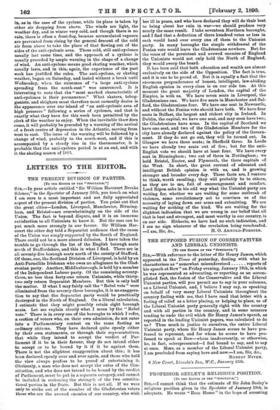LETTERS TO THE EDITOR.
THE PRESENT DIVISION OF PARTIES.
[To THE EDITOR OF THE "SPECTATOR."] SIR,—In your article entitled "Sir William Harcourt Breaks Silence," in the Spectator of January 266h, you touch on what I am sure is a most important and not fully appreciated aspect of the present division of parties. You point out that the great cities—London, Liverpool, Manchester, Birming. ham, and Bristol—are overwhelmingly on the side of the Union. The fact is beyond dispute, and it is an immense satisfaction to all Unionists to know it. But the case can be put much more strongly in our favour. Sir William Har- court the other day told a Separatist audience that the cause of the Union was simply supported by the South of England. There could not be a more absurd delusion. I have taken the trouble to go through the list of the English borough seats north of Staffordshire, and this is what I find. There are in all seventy-five borough seats north of the county of Stafford. Of these, one, the Scotland Division of Liverpool, is held by an Anti-Parnellite Irishman who owes no allegiance to the Glad- stonian party. Another, Middlesborough, is held by a member of the Independent Labour party. Of the remaining seventy- three, no less than forty-one return Unionists, while thirty- two only return Separatist Members. But this is only half the matter. If what I may fairly call the " Rebel vote " were eliminated from the seventy-three boroughs, it is no exaggera- tion to say that the Separatist party would be practically destroyed in the North of England. On a liberal calculation, I estimate that they might possibly retain eight borough seats. Let me explain clearly what I mean by the "Rebel vote." There is in every one of the boroughs to which I refer, a section of voters who, on their own admission, do not enter into a Parliamentary contest on the same footing as ordinary citizens. They have declared quite openly either by their own statements, or through their representatives, that while they intend to accept the verdict of Par- liament if it be in their favour, they do not intend either to accept or to be bound by it if it be against them. There is not the slightest exaggeration about this ; it has been declared openly over and over again, and those who hold the view always profess to be proud of entertaining it. Obviously, a man who does not accept the rules of the Con- stitution, and who does not intend to be bound by the verdict of Parliament, must be put in a separate category, and cannot be included in reckoning the strength of the two constitu- tional parties in the State. But this is not all. If we were only to strike out of the number of the Gladstonian voters those who are the avowed enemies of our country, who wish her ill in peace, and who have declared they will do their best to bring about her ruin in war—we should produce very nearly the same result. I take seventeen Northern boroughs,. and I find that a deduction of three hundred votes or less in each would hand over every one of them to the Unionist party. In many boroughs the simple withdrawal of the Fenian vote would leave the Gladstonians nowhere. But for the votes of the persistent and avowed enemies of England the Unionists would not only hold the North of England, they would sweep the board.
It has been said that both education and wealth are almost exclusively on the side of the Opposition. The fact is true, and it is one to be proud of. But it is equally a fact that the enormous preponderance of honest, intelligent, law-abiding- English opinion in every class is on our side too. At this moment the great majority of London, the capital of the- Empire, is with us. We have seven seats in Liverpool, the Gladstonians one. We have five seats in Manchester and Sal- ford, the Gladstonians four. We have one seat in Newcastle, and without the Fenian vote should have both. We have four seats in Belfast, the largest and richest city in Ireland. In Dublin, the capital, we have one seat, and may soon have two; the Gladstonians have none. In the capital of Scotland we- have one seat, and two of the Gladstonian Members for the city have already declared against the policy of the Govern- ment. If they do not go out, they will be turned out. In Glasgow we have three seats; in Sheffield three. In Leeds we have already two seats out of five; but for the anti- English vote we should have at least four. We have every seat in Birmingham ; two out of three in Nottingham ; we hold Bristol, Exeter, and Plymouth, the three capitals of the West. In short, the great current of educated and intelligent British opinion is with us, and is growing stronger and broader every day. These facts are, I venture to think, worth recalling; they will probably be to others,. as they are to me, fall of encouragement and comfort.. Lord Ripon asks in his odd way what the Unionist party are waiting for, whether we are waiting for some outbreak of violence, some revolutionary act to convince us of the necessity of laying down our arms and submitting. We are waiting for nothing of the kind. We are waiting for the slightest indication that we are wrong in our belief that all that is best and strongest, and most worthy in our country, is on our side. Hitherto, we have had no such indication, and I see no sign whatever of the revelation being vouchsafed..


































 Previous page
Previous page